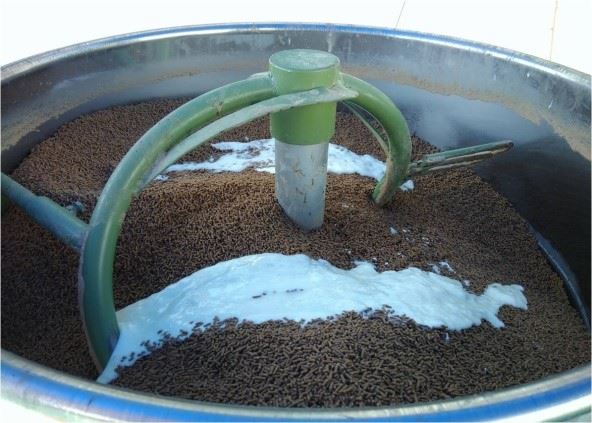News
Yogurt makes tilapia stronger
- PostDate:2022-02-01
In recent years, due to the abnormally high temperatures experienced in summer, tilapia has been attacked by bacteria, which has caused heavy losses to the aquaculture industry. According to the Fisheries Research Institute, it has developed a probiotic that helps to improve the growth of tilapia and enhance their own immunity- lactic acid bacteria (Leuconostoc mesenteroides B4), and its glucan product-Leuconostoc mesenteroides B4 functional yogurt. The addition of this yogurt to tilapia feed in conjunction with good breeding management practices can effectively improve the growth of tilapia, shorten the culture time, and reduce the culture risk.
The Fisheries Research Institute pointed out that glucan can be used as an emulsifier, thickener, and flavor carrier in food processing. In terms of health care, studies have shown that glucan can be used as a prebiotic to increase the number of probiotic bacteria-bifidobacterium and lactic acid bacteria found in the human body and strengthen the immune system. Leuconostoc mesenteroides B4 was previously selected by the Fisheries Research Institute from the intestines of sea bass as a probiotic with special enzymes. Moreover, adding low-cost sucrose to it can prompt Leuconostoc mesenteroides B4 to produce glucan. In addition, functional yogurt and ice cream have also been developed, which feature a delicate and delicious taste containing glucan using Leuconostoc mesenteroides B4.
As pointed out in the literature, the Fisheries Research Institute explained that the use of probiotics or prebiotics as feed additives, such as polysaccharides and oligosaccharides, can effectively enhance the growth and immunity of fish and shrimp, and the benefits of combining both are usually higher than the sum of the effects of the two alone. At present, the general application is probiotics with additional expensive prebiotics, while Leuconostoc mesenteroides B4 from the Fisheries Research Institute is a probiotic that resists a variety of aquatic pathogens, and can produce glucan by itself, thus, the Institute applies Leuconostoc mesenteroides B4 yogurt to aquaculture. Experimental research shows that adding Leuconostoc mesenteroides B4 yogurt to tilapia feed can help to improve the growth and resistance of Epinephelus coioides to pathogenic bacteria.
According to the Fisheries Research Institute, due to climate change and the abnormally high temperatures experienced during summer in recent years, tilapia is prone to bacteria attacks and may die in severe cases, which leads to losses of aquaculture farmers. Since 2020, the Kaohsiung City Animal Protection Office has sought technical assistance from the Fisheries Research Institute to solve the problems of tilapia breeders. In terms of feeding, the results of tilapia field tests in Hunei District, Kaohsiung City showed that the quality of fish in the experimental pond was better than that of the control pond, and the tilapia grew quite fast after adding 1% Leuconostoc mesenteroides B4 yogurt in the feed for two months. Moreover, when the fish were harvested at the end of May, there was no disease, the average weight of the fish was 570 grams, and the fish were healthy. Furthermore, during the harvest, the fishermen had to wear safety helmets to avoid being hurt by the energetic jumping tilapia. The fish in the control pond had poorer feeding conditions than those in the experimental pond and grew more slowly. In mid-June, when the temperature increased, the fish suffered from streptococcal disease and had to be treated with drugs, and thus, could only be harvested at the end of June with an average weight of 467 grams, which is much lower than that of the experimental pool.
The Fisheries Research Institute further pointed out that, in order to determine whether tilapia can survive the harsh summer when fed with feed containing Leuconostoc mesenteroides B4 yogurt, the Institute and the Kaohsiung City Animal Protection Office specifically arranged an experiment in the summer of 2021. The results of the experiment showed that although the tilapia in the experimental group, which were fed Leuconostoc mesenteroides B4 yogurt, and the tilapia in the control group both suffered from streptococcosis, the fish in the experimental group were mildly ill and recovered in only three days after drug treatment, while the illness in the control group was more serious, and required more than seven days of drug treatment. Therefore, adding Leuconostoc mesenteroides B4 yogurt to the feed of tilapia can help improve the growth and health of the fish, shorten the breeding time, and reduce the breeding risk and the severity of the disease. In terms of cost, the cost of adding Leuconostoc mesenteroides B4 yogurt in the feed is about NTD 0.5 per kilogram of feed, which is acceptable to breeders.
The Fisheries Research Institute has transferred the Leuconostoc mesenteroide B4 technology to four probiotic manufacturers and is applying for a technology patent with the Intellectual Property Office, Ministry of Economic Affairs for adding Leuconostoc mesenteroide B4 yogurt to the feed. When the application of this technology is expanded to various aquaculture species, it will effectively increase the growth of cultured organisms, as well as their ability to resist diseases, which will reduce the use of drugs and provide consumers with safe and healthy quality aquatic products.

In the experimental pond, the feed was mixed with Leuconostoc mesenteroide B4 yogurt by an electric mixer before feeding the tilapia

